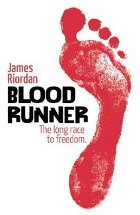Blood runner by James Riordan

Frances Lincoln Children's Books, 2011. ISBN 9781845079345.
In a preface to this story concerning the black struggle against
apartheid in South Africa, James Riordan states that the work is
fictional rather than biographical. It is however based upon Josiah
Thugwane, a marathon runner and the first black man to win an
Olympic gold medal representing South Africa.
Riordan blends aspects of the 1960 Sharpeville Massacre with the
1976 Soweto uprising to create a traumatic event which determines
the main character Samuel's life course and is plausible within the
tale's chronology.
The story vividly portrays the almost unbelievable civil rights
abuses perpetrated against black South Africans by a ruling minority
prior to 1994, particularly in reference to the brutality and
violence applied to suppress the black population.
Portrayal of the Marathon is apt in light of Mandela's work The
long walk to freedom as personal courage, patience and
endurance are evident in both.
Samuel must prepare himself over many years and overcomes various
setbacks and failures in pursuit of his goals. Like Mandela
stoically maintaining his vision, Samuel must make great personal
sacrifices and comes to appreciate that if he can attain victory
then this will be shared by his people.
The language is simple and whilst some content is confronting, young
teens should not struggle to understand the historical themes behind
the narrative. I did consider Samuel's and his brothers' subdued
reaction to a monstrously traumatic event to be unrealistic, however
this is a small flaw in an otherwise great story. Similarly, the
inclusion of an eccentric uncle in the Bantu homelands as a device
to introduce running seemed clumsy, yet the conclusion warrants
acceptance of such elements.
Having an extremely striking cover, the book is likely to be
selected from the shelves and I hope that young teenagers will read
and learn about both human misery and triumph in this true-to-life
tale.
Rob Welsh